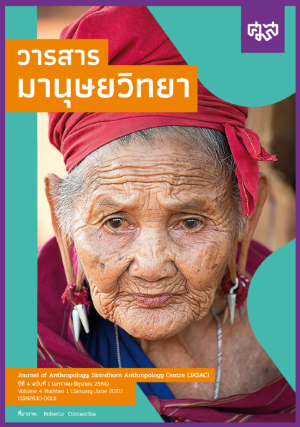การสร้างตัวตนในสังคมโลกเสมือนจริงผ่านการเล่นคอมมู กรณีศึกษาคอมมู E.O.S
Main Article Content
บทคัดย่อ
บทความวิจัยชิ้นนี้ มีวัตถุประสงค์ หนึ่ง เพื่อศึกษาสาเหตุที่กลุ่มกรณีศึกษาเข้ามาเล่นคอมมู สอง เพื่อศึกษาการแสดงออกถึงตัวตนและการสร้างปฏิสัมพันธ์ในคอมมู และ สาม เพื่อศึกษาผลกระทบของสมาชิกในคอมมูในโลกความเป็นจริง โดยใช้กรณีศึกษา คอมมู E.O.S ใช้รูปแบบการวิจัยเชิงคุณภาพ ทำการศึกษาจากเอกสารที่เกี่ยวข้อง การสัมภาษณ์เชิงลึก และแบบสอบถามออนไลน์แบบปลายเปิด โดยใช้แนวคิดเกี่ยวกับชุมชนเสมือนจริง (Virtual Community) และแนวคิดเกี่ยวกับตัวตนและเกี่ยวกับอัตลักษณ์ (Identity)
ผลการศึกษา พบว่า ประการที่หนึ่ง สาเหตุกลุ่มกรณีศึกษาเข้ามาเล่นคอมมู พบว่าการเข้าร่วมคอมมูของสมาชิกในกลุ่มกรณีศึกษาเกิดจากความสนใจร่วมกันในการเล่นคอมมู โดยเริ่มต้นจากการแชร์ผ่านหน้าเฟซบุคต่อกันมาจนได้เข้าร่วมกลุ่มโฆษณาคอมมู หรือมาจากการชักชวนของเพื่อนหรือคนรู้จัก ประการที่สอง การแสดงออกถึงตัวตนและการสร้างปฏิสัมพันธ์ในคอมมู พบว่า ตัวตนของตัวละครที่เรียกรวมว่า ‘ออริ’ มีความสัมพันธ์กับตัวตนของผู้เล่น ทั้งมีลักษณะที่คล้ายคลึงกับตัวผู้เล่นในชีวิตจริง เช่น ลักษณะนิสัย ความชื่นชอบหรือความไม่ชื่นชอบ เป็นต้น และมีทั้งที่ไม่คล้ายคลึงกับผู้เล่นในชีวิตจริง แต่ผู้เล่นได้มีความปรารถนาอยากมีตัวตนในลักษณะดังกล่าวตามจินตนาการ และประการที่สาม ผลกระทบของสมาชิกในคอมมูในโลกความเป็นจริง พบว่า การเล่นคอมมูของกลุ่มกรณีศึกษาส่งผลกระทบในเชิงบวกจากสมาชิก ได้แก่ เพิ่มทักษะต่างๆ เช่น การวาดรูป การเขียนนิยาย เป็นต้น ความสามารถในการสร้างปฏิสัมพันธ์กับโลกความเป็นจริงที่เพิ่มขึ้น และช่วยให้เข้าใจความหลากหลายทางความคิดของคนในคอมมูมากขึ้น
Article Details

อนุญาตภายใต้เงื่อนไข Creative Commons Attribution-NonCommercial-NoDerivatives 4.0 International License.
ลิขสิทธิ์@ของวารสารมานุษยวิทยา
ศูนย์มานุษยวิทยาสิรินธร (องค์การมหาชน), กรุงเทพฯ, ประเทศไทย
ข้อมูลเพิ่มเติม:
https://creativecommons.org/licenses/by-nc-nd/4.0/
เอกสารอ้างอิง
กชพรรณ อุปรอกชาติพงษ์. 2525. ปัจจัยความสำเร็จของชุมชนเสมือนจริงเพื่อสร้าง ความสัมพันธ์: กรณีศึกษาเว็บไซต์ hi5 ในประเทศไทย. การค้นคว้าอิสระ วิทยาศาสตรมหาบัณฑิต สาขาวิชาการบริหารเทคโนโลยี วิทยาลัยนวัตกรรม มหาวิทยาลัยธรรมศาสตร์.
กำจร หลุยยะพงศ์. 2558. “ก้าวที่ผ่านมาและก้าวต่อไปของการสื่อสารชุมชน: ตอนที่ 2 การศึกษาการ สื่อสารชุมชนในรูปแบบใหม่”, วารสารนิเทศศาสตร์และนวัตกรรม นิด้า, 2(1): 1-30.
โกมาตร จึงเสถียรทรัพย์. 2562. “ความเป็นมนุษย์ในโลกดิจิตัล”. ใน นฤพนธ์ ด้วงวิเศษ, (บก.), คน-สังคม-ดิจิทัล: รวมบทความคัดสรรจากการประชุมวิชาการทางมานุษยวิทยาครั้งที่ 13 พ.ศ. 2562. (หน้า 12-53). กรุงเทพฯ: ศูนย์มานุษยวิทยาสิรินธร (องค์การมหาชน).
คอมมู E.O.S. 2562. Entrancer Organisation Supervisor. https://docs.google.com/document/d/1IBIYctdLzx_VwD48i-8j2Yr0MnBBnMG0aPmmautIx8k/edit. (7 พฤศจิกายน 2562).
จิรัฎฐ์ ศุภการ. 2545. การอธิบายตัวตนในชุมชนเสมือนจริง. วิทยานิพนธ์ปริญญานิเทศศาสตรมหาบัณฑิต จุฬาลงกรณ์มหาวิทยาลัย.
นฤพนธ์ ด้วงวิเศษ (บก.). 2562. คน-สังคม-ดิจิทัล: รวมบทความคัดสรรจากการประชุมวิชาการทางมานุษยวิทยาครั้งที่ 13 พ.ศ. 2562. กรุงเทพฯ: ศูนย์มานุษยวิทยาสิรินธร (องค์การมหาชน).
ปลาทูกับโหลดอง. 2560. คอมมู มาเล่นสวมบทบาทในสังคมแห่งจินตนาการกันเถอะ. สืบค้นจาก https://www.plotter.in.th/?p=3144 (7 พฤศจิกายน 2562).
พชรมน พิริยะสกุลยิ่ง. 2549. กระบวนการสร้างกลุ่มเพื่อนโดยการสนทนาแบบออนไลน์ : ศึกษากรณีกลุ่มเพื่อนมิตรภาพ. วิทยานิพนธ์ สังคมวิทยามหาบัณฑิต สาขาสังคมวิทยา จุฬาลงกรณ์มหาวิทยาลัย.
อภิญญา เฟื่องฟูสกุล. 2546. อัตลักษณ์ (Identity). กรุงเทพฯ: สำนักงานคณะกรรมการวิจัย แห่งชาติ.
อภิษฐา ดวงมณี. 2562. “สู่โลกบอท: ความเป็นบุคคลของบอทศิลปินเกาหลีในทวิตเตอร์”. ใน นฤพนธ์ ด้วงวิเศษ (บก.), คน-สังคม-ดิจิทัล: รวมบทความคัดสรรจากการประชุมวิชาการทางมานุษยวิทยาครั้งที่ 13 พ.ศ. 2562. (หน้า 150-175). กรุงเทพฯ: ศูนย์มานุษยวิทยาสิรินธร (องค์การมหาชน).
Advertising Community [กลุ่มฝากคอมมู]. 2562. Advertising Community [กลุ่มฝากคอมมู]. https://web.facebook.com/groups/1648742072078954/?ref=bookmarks&fb_dtsg_ag=AQztDSYPnUJmSKl79MTgJ2y5Z4RtRpkD3_IleL628dZiqw%3AAQy_CaGOsxmYDdGBhNxE9TUf1Mp82xTWq2KqntIOuMZ4uw&jazoest=28029&__m_async_page__=1.
(30 ธันวาคม 2562).
Cover, R. 2016. Digital Identity: Creating and Communicating the Online Itself. London: Elsevier.
Davis, J. L. 2016. “Identity Theory in a Digital Age”. In Stets, Jan E. and Serpe, Richard T. (ed.), New Directions in Identity Theory and Research. (pp. 137-164). New York: Oxford University Press.
Sullivan, C. 2011. Digital Identity. South Australia: University of Adelaide Press.


